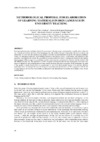Identificador persistente para citar o vincular este elemento:
https://accedacris.ulpgc.es/jspui/handle/10553/47348
| Título: | Methodological proposal for elaboration of learning materials in sing language in university teaching | Autores/as: | Viera-Santana, J. Guillermo Rodríguez-Esparragón, Dionisio Hernández-Haddad, Juan C. Castillo-Ortiz, Jesús |
Clasificación UNESCO: | 531204 Educación | Palabras clave: | Avatar Hearing impairmed Higher education Rotoscoping Sign language |
Fecha de publicación: | 2015 | Editor/a: | International Association for Development of the Information Society (IADIS) | Conferencia: | International Conference on e-Learning 2015, E-LEARNING 2015, Las Palmas de Gran Canaria, Jul. 21-24 2015 | Resumen: | Hearing impairment may constitute a barrier for accessing to information and communication in public places. Since the oral communication forms the basis of the learning process, this problem becomes of particular relevance at schools and universities. To cope with this situation is not enough to provide a textual translation for people with hearing disabilities, society via educational authorities must facilitate alternatives that improve access to information and education to this collective. According to this reality, the possibility of having an alternative tool of communication based in the Spanish Sign Language (SSL) emerges as a contribution to help overcoming the communication obstacles that the students with this difficulty usually find. | URI: | https://accedacris.ulpgc.es/handle/10553/47348 | ISBN: | 978-989-8533-40-1 | Fuente: | Proceedings of the International Conference on e-Learning 2015 / Piet Kommers, Pedro Isaías and Heredina Fernandez Betancort (eds.), p. 90-96 |
| Colección: | Actas de congresos |
Visitas
36
actualizado el 10-ene-2026
Descargas
22
actualizado el 10-ene-2026
Google ScholarTM
Verifica
Altmetric
Comparte
Exporta metadatos
Los elementos en ULPGC accedaCRIS están protegidos por derechos de autor con todos los derechos reservados, a menos que se indique lo contrario.
